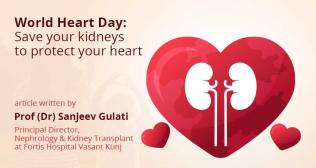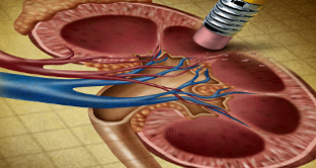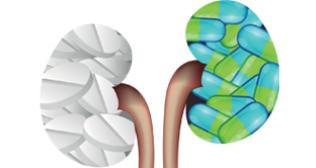
Understanding & Managing Urinary Incontinence
Urinary incontinence is an accidental loss or reduction of bladder control in which a person urinates involuntarily. It can range from mild leaking to uncontrollable wetting. It can be a very emotionally distressing problem that starts affecting daily activities. Seeking a professional help for this is the first step towards taking control of urinary incontinence. With certain lifestyle changes and medications, one can stop or ease the discomfort that accompanies it. Let’s learn more about incontinence, understanding the symptoms, causes, and treatments.
Types of Urinary Incontinence
There are 4 main types of urinary incontinence
- Stress incontinence – In this, the urine generally leaks out when there is sudden or extra pressure on the bladder; usually seen during coughing or laughing.
- Urge incontinence – In this, there is an almost negligible time gap between the intense urge to urinate and to actually urinate
- Overflow incontinence (chronic urinary retention) – In this type, you feel an inability to empty your bladder fully causing frequent leaking
- Total incontinence – In this type, your bladder is incapable of storing any urine at all, prompting you to discharge urine repetitively or have recurrent leaking
Stress and urge incontinence is sometimes found in combination in some cases.
Causes of urinary incontinence
- Stress incontinence is caused when muscles are weakened or damaged. These are the pelvic floor muscles or the urethral sphincter.
- Urge incontinence is caused due to the overactivity of a group of muscles that control the bladder(detrusor muscles)
- Overflow incontinence is usually caused due to an obstruction of the bladder, which stops it from emptying fully.
- Total incontinence may be caused by a problematic bladder by birth, a bladder fistula, or a spinal injury.
Chances of urinary incontinence can be increased by certain factors like:
- pregnancy and vaginal birth
- obesity
- a family history of incontinence
- increasing age – although incontinence is not a certain part of aging
Symptoms of urinary incontinence
- Stress incontinence: In this type, the urine gets leaked when there is sudden or extra pressure on the bladder – for example when you have a cough. It is not associated with the actual word stress or being stressed. Urine may also happen to leak during sneezing, laughing, heavy lifting or exercise. Usually, lesser amounts of urine are passed but sometimes large amount of urine passes if the bladder is very full.
- Urge incontinence: In this type, you feel a rapid and forceful need to urinate and you can’t afford to delay in reaching out to a washroom. Time and again, you will find the negligible gap between the need to urinate and discharging it. You will happen to feel the necessity to urinate frequently during the night time or when you have sex or reach an orgasm. The need to urinate will also be triggered by trivial things like when you dislodge yourself from a steady position or by the sound of gushing water. You may accidentally pass urine while having sex, especially when you are about to reach orgasm or get a frequent urge to urinate during the night time.
- Mixed incontinence: Presence of symptoms of both stress and urge incontinence is called mixed incontinence. For example, you may feel a strong desire to pass urine along with coughing and sneezing.
- Overflow incontinence: In this type, you may pass slight dribbles of urine very frequently. It leaves you with a constant feeling of incomplete emptying of your bladder.
- Total incontinence: In this type, the bladder loses its functionality of storing any urine at all. One constantly feels the urge to continuously or periodically urinate. Most of the times it is an indicator of some anatomical defect.
- Lower urinary tract symptoms (LUTS):The bladder and urethra constitute the lower urinary tract. These can be grouped into obstructive or storage symptoms.
Diagnosing urinary incontinence
A doctor conducts a physical exam (pelvic & digital rectal exam) and takes the medical history of the patient. Based on the above, he might order one or more of the following tests to detect the type of incontinence.
- Urinalysis
- Urine culture
- Blood test
- Urodynamic testing
Treatment of urinary incontinence
Initially, the doctor might suggest plain home remedies to improve your symptoms. These may include:
- lifestyle modification – such as shedding excess weight and reducing the intake of caffeine and alcohol
- pelvic floor exercises – This includes squeezing your pelvic floor muscles, usually taught by a specialist
- bladder training – Training the bladder to improve between the wait time between the urge to pass urine and actually discharging, taught by a specialist
Others include:
- Using adult diapers and handheld urinals.
- Certain medication to reduce your symptoms
- Surgery based on the type of your incontinence
Urinary incontinence is an accidental loss or reduction of bladder control in which a person urinates involuntarily. It can range from mild leaking to uncontrollable wetting. It can be a very emotionally distressing problem that starts affecting daily activities. Seeking a professional help for this is the first step towards taking control of urinary incontinence. With certain lifestyle changes and medications, one can stop or ease the discomfort that accompanies it. Let’s learn more about incontinence, understanding the symptoms, causes, and treatments.
Types of Urinary Incontinence
There are 4 main types of urinary incontinence
-
Stress incontinence – In this, the urine generally leaks out when there is sudden or extra pressure on the bladder; usually seen during coughing or laughing.
- Urge incontinence – In this, there is an almost negligible time gap between the intense urge to urinate and to actually urinate
- Overflow incontinence (chronic urinary retention) – In this type, you feel an inability to empty your bladder fully causing frequent leaking
- Total incontinence – In this type, your bladder is incapable of storing any urine at all, prompting you to discharge urine repetitively or have recurrent leaking
Stress and urge incontinence is sometimes found in combination in some cases.
Causes of urinary incontinence
-
Stress incontinence is caused when muscles are weakened or damaged. These are the pelvic floor muscles or the urethral sphincter.
- Urge incontinence is caused due to the overactivity of a group of muscles that control the bladder(detrusor muscles)
- Overflow incontinence is usually caused due to an obstruction of the bladder, which stops it from emptying fully.
- Total incontinence may be caused by a problematic bladder by birth, a bladder fistula, or a spinal injury.
Chances of urinary incontinence can be increased by certain factors like:
- pregnancy and vaginal birth
- obesity
- a family history of incontinence
- increasing age – although incontinence is not a certain part of aging
Symptoms of urinary incontinence
- Stress incontinence: In this type, the urine gets leaked when there is sudden or extra pressure on the bladder – for example when you have a cough. It is not associated with the actual word stress or being stressed. Urine may also happen to leak during sneezing, laughing, heavy lifting or exercise. Usually, lesser amounts of urine are passed but sometimes large amount of urine passes if the bladder is very full.
- Urge incontinence: In this type, you feel a rapid and forceful need to urinate and you can’t afford to delay in reaching out to a washroom. Time and again, you will find the negligible gap between the need to urinate and discharging it. You will happen to feel the necessity to urinate frequently during the night time or when you have sex or reach an orgasm. The need to urinate will also be triggered by trivial things like when you dislodge yourself from a steady position or by the sound of gushing water. You may accidentally pass urine while having sex, especially when you are about to reach orgasm or get a frequent urge to urinate during the night time.
- Mixed incontinence: Presence of symptoms of both stress and urge incontinence is called mixed incontinence. For example, you may feel a strong desire to pass urine along with coughing and sneezing.
- Overflow incontinence: In this type, you may pass slight dribbles of urine very frequently. It leaves you with a constant feeling of incomplete emptying of your bladder.
- Total incontinence: In this type, the bladder loses its functionality of storing any urine at all. One constantly feels the urge to continuously or periodically urinate. Most of the times it is an indicator of some anatomical defect.
- Lower urinary tract symptoms (LUTS):The bladder and urethra constitute the lower urinary tract. These can be grouped into obstructive or storage symptoms.
Diagnosing urinary incontinence
A doctor conducts a physical exam (pelvic & digital rectal exam) and takes the medical history of the patient. Based on the above, he might order one or more of the following tests to detect the type of incontinence.
- Urinalysis
- Urine culture
- Blood test
- Urodynamic testing
Treatment of urinary incontinence
Initially, the doctor might suggest plain home remedies to improve your symptoms. These may include:
- lifestyle modification – such as shedding excess weight and reducing the intake of caffeine and alcohol
- pelvic floor exercises – This includes squeezing your pelvic floor muscles, usually taught by a specialist
- bladder training – Training the bladder to improve between the wait time between the urge to pass urine and actually discharging, taught by a specialist
Others include:
- Using adult diapers and handheld urinals.
- Certain medication to reduce your symptoms
- Surgery based on the type of your incontinence
Coping and support: Urinary incontinence is common but a serious problem. Social withdrawal due to the problem can only lead to depression. Do not be hesitant in seeking professional help to gain back control over your bladder. A wide range of effective treatments is available to aid you in leading a fulfilling, confident and an eventful life.Urinary incontinence is common but a serious problem. Social withdrawal due to the problem can only lead to depression. Do not be hesitant in seeking professional help to gain back control over your bladder. A wide range of effective treatments is available to aid you in leading a fulfilling, confident and an eventful life.



















